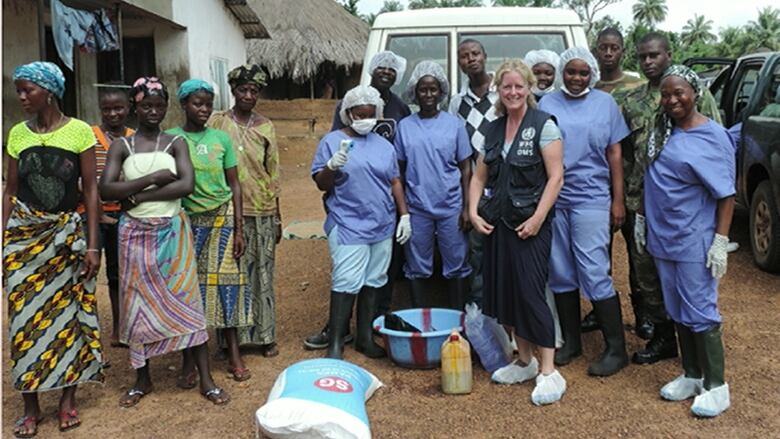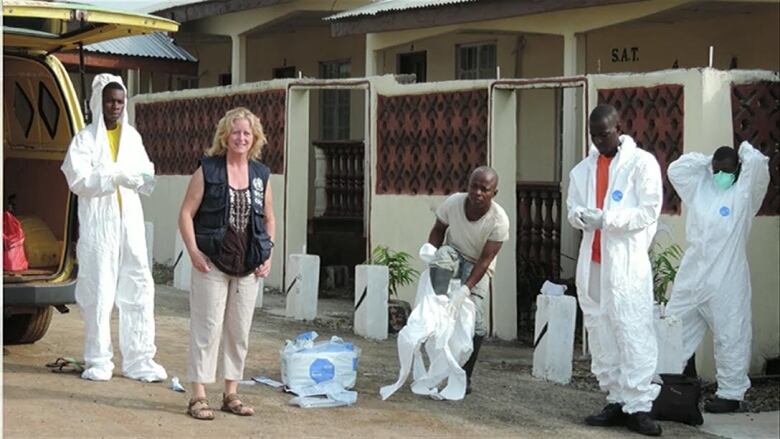New Brunswick doctor recalls working in Ebola-stricken regions
Dr. Eilish Cleary reflects on her time in Sierra Leone visiting areas affected by the Ebola virus

During more than six months spent helping to fight the spread of Ebola in Sierra Leone, Dr.Eilish Cleary only let herself cry once.
Cleary is New Brunswick's Chief Medical Officer of Health. She's been to Sierra Leone twice since last October, working with the World Health Organization.
Part of her job was to go into towns and villages and assess how people were being treated and how they were being buried when they died.
"There was this one day that I went out with a burial team, went to a cemetery, and the cemetery was quite large, maybe 30 [or] 50graves that had already been filled,"Clearyrecalled."And the reason I was there was to try and watch the practices of the burial team, to make recommendations about decreasing the risk to the team, to the communities from Ebola burials."
She watched as the team pulled up in a pickup truck and a van, puton their personalprotective equipment, including full gowns, gloves, rubber boots and hoods. They carried the bodyin its blackplastic bag over the mounds of earth to the gravesite.
"And there were a couple of people standing around watching and one of them I saw was a young boy. I didn't really pay too much attention to him and then I noticed an expression on his face. He was very, well, he just looked grief-stricken," said Cleary.
She watched the burial team finish their work, including filling the grave with branches, according to the local custom. Then, they sprayed down all of their equipment with chlorineand threw it into the grave as well.
"And then they went off. But I was still watching this boy, and I said to someone, 'Who is that?' And they said that was his father that had been buried, and that three otherof his family members had died of Ebola, and that the rest of the family were in the treatment unit, so he was the only one. And I felt so sad watching him, because there we were doing our work, and [going] about our business and burying somebody. But for him, this was his life," said Cleary.

"It just really made me think about Ebola and the impact on communitiesand on people. It's too easy for us to forget, whether we're sitting here in Canada, or over there working away, that it really is all about people. No matter what we do in a response, we have to remember that."
As of the end of May, the World Health Organization (WHO) has statedthere havebeen more than 27,000 Ebola cases, 11,000 resulting in death mostly in West Africa. The spread of the virus has slowed significantly in recent months.In early May, there was a 10-month low in the number of new Ebola cases being reported, although those numbers have increased slightly since then.
However, when Cleary wentto Nigeria and then to Sierra Leone last fall, WHO was tracking the largest ever outbreak of the diseaseand was asking for help from the international community. Cleary felt she couldn't stay home and let others do the work.
Reflections
She's said she doesn't judge some medical professionals for choosing not to travel to Ebola-affected regions, butshe does feel it's important to act responsibly and effectively.
"I think we have an obligation and a societal responsibility to do so. And we do tend to look at things that are just impacting us closely, our own particular communities, and I think as health professionals particularly in public health we need to be conscious that we have a responsibility to others including those who live in other countries,and particularly those who have less ability to care for themselves," said Cleary.
Cleary returned to Fredericton last monthwhere she lives with her husband and four children.
She recalls it was difficult living in the absence of human touch, as everyone was discouraged from touching each otherto lower the risk of contracting the disease.
"Many people talked about how it'll be nice to feel a hug again, or to feel human touch again, after spending weeks or months in the country," saidCleary.
At leastinternational aid workers knew they would be going home, Clearysaid.
"For the people of Sierra Leone, who were also being actively encouraged not to touch each other, to practice what we call social distancingI think it must have been very [hard] on them to be told, 'Well, don't be touching a person when they're sick or dying,'" she said.












_(720p).jpg)


 OFFICIAL HD MUSIC VIDEO.jpg)
.jpg)



























































































